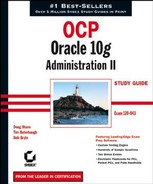12.12. Review Questions
Which DBMS_SCHEDULER procedures can be used to enable a program? (Choose all that apply.)
ENABLE
ENABLE_PROGRAM
VALIDATE_PROGRAM
SET_ATTRIBUTE
SET_ENABLED
Which of the following is not a valid calendaring syntax element?
FREQ
BYHOUR
RUNDATE
INTERVAL
BYMINUTE
Which Scheduler view(s) can be queried to see which jobs are currently executing? (Choose all that apply.)
DBA_SCHEDULER_JOB_RUN_DETAILS
DBA_SCHEDULER_RUNNING_JOBS
DBA_SCHEDULER_CURRENT_JOBS
DBA_SCHEDULER_JOBS
DBA_SCHEDULER_EXECUTING_JOBS
A schedule defined entirely within the confines of a Scheduler job object is known as a(n) _________________.
Fixed schedule
Inline schedule
Stored schedule
Hard-coded schedule
None of the above
Which DBMS_SCHEDULER procedure(s) can be used to alter an existing job? (Choose all that apply.)
SET_ATTRIBUTE_NULL
ALTER_JOB
ALTER_JOB_PARAMETERS
ALTER
SET_ATTRIBUTE
What is the default value for the ENABLED attribute of a job or program when it is created?
TRUE
FALSE
There is no default. It must be defined at creation time.
PENDING
NULL
To set the history retention period for either window logging or job logging individually, which two parameters of the SET_SCHEDULER_ATTRIBUTE procedure need to be used?
LOG_HISTORY
JOB_LOG_RETENTION
WINDOW_LOG_RETENTION
WHICH_LOG
LOG_NAME
Consider the following code snippet: begin
begin dbms_scheduler.run_job('COLA_JOB',TRUE); end;
If this code were executed, which of the following statements would be true? (Choose all that apply.)
The COLA_JOB job would be executed asynchronously.
The COLA_JOB job would be executed synchronously.
The COLA_JOB job would run in the user's current session.
The COLA_JOB job would run with the FORCE option.
The user could continue to issue SQL statements in the session while the COLA_JOB job was executing.
Which of the following calendaring syntax expressions would evaluate to the last day of every month?
FREQ = MONTHLY; BYMONTHDAY = 31
FREQ = MONTHLY; BYMONTHDAY = −1
FREQ = DAILY; BYDAY = −1
FREQ = MONTHLY; BYDAY = 31
FREQ = DAILY; BYMONTHDAY = LAST_DAY
Which of the following tasks is not performed by the job coordinator?
Update job log when a job completes
Spawn and remove job slaves
Write/read job info to/from memory cache
Query job table
Pass job information to job slaves
Which of the following objects can be directly referenced by a window object? (Choose all that apply.)
Schedule object
Program object
Job object
Resource plan
Resource Consumer Group
Which DBMS_SCHEDULER procedure is available for testing repeat intervals produced by calendaring syntax expressions?
EVALUATE_REPEAT_INTERVAL
VALIDATE_CALENDAR_EXPRESSION
EVALUATE_CALENDAR_STRING
VALIDATE_CALENDAR_STRING
EVALUATE_INTERVAL_EXPRESSION
Which of the following is not a valid setting for the PROGRAM_TYPE parameter in a program object or the JOB_TYPE parameter in a job object?
PLSQL_BLOCK
JAVA_STORED_PROCEDURE
STORED_PROCEDURE
EXECUTABLE
None of the above are invalid settings.
Which of the following Scheduler elements encourage object reuse? (Choose all that apply.)
Schedule objects
Program arguments
Job classes
Job arguments
All of the above
What is the danger associated with stopping a running job by using the STOP_JOB procedure?
The job will need to be re-enabled before it will execute again.
The job may hold locks on objects referenced within the job.
All jobs within the job group will also be stopped.
The job may leave data in an inconsistent state.
There is no danger in using the STOP_JOB procedure.
If a job references a schedule that has been disabled, what will be the result?
The job will be automatically disabled.
The job will never execute.
The job will attempt to execute, but will fail.
The job will inherit the DEFAULT_SCHEDULE schedule.
A schedule object cannot be disabled.
When a job exceeds the date specified in its END_DATE attribute, which of the following will happen? (Choose all that apply.)
The job will be dropped automatically if the value of the AUTO_DROP attribute is TRUE.
The job will be disabled if the value of the AUTO_DROP attribute is FALSE.
The STATE attribute of the job will be set to COMPLETED if the value of the AUTO_DROP attribute is FALSE.
All objects referenced by the job will be dropped if the value of the AUTO_DROP attribute is TRUE and the value of the CASCADE attribute is TRUE.
The STATE column of the job table will be set to COMPLETED for the job.
Which view can you query to see information on Scheduler windows?
DBA_WINDOWS
DBA_SCHEDULER_WINDOWS
DBA_WINDOW_OBJECTS
DBA_SCHEDULER_WINDOW_OBJECTS
DBA_ALL_SCHEDULER_WINDOWS
If two windows overlap, which window attribute will determine if one should be chosen over the other?
WINDOW_PRIORITY
PRIORITY
PRIORITY_LEVEL
WINDOW_PRIORITY_LEVEL
OVERLAP_RULE
